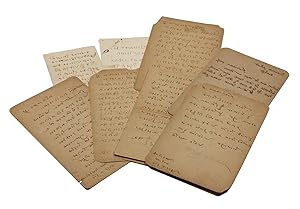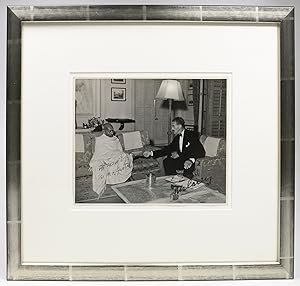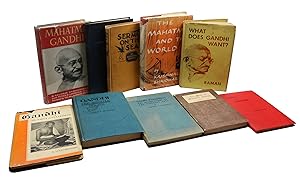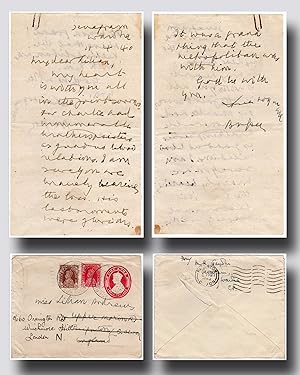Mohandas Gandhi: Manuscripts & Paper Collectibles (9 results)
Search filters
Product Type
- All Product Types
- Books (No further results match this refinement)
- Magazines & Periodicals (No further results match this refinement)
- Comics (No further results match this refinement)
- Sheet Music (No further results match this refinement)
- Art, Prints & Posters (No further results match this refinement)
- Photographs (No further results match this refinement)
- Maps (No further results match this refinement)
- Manuscripts & Paper Collectibles (9)
Condition Learn more
- New (No further results match this refinement)
- As New, Fine or Near Fine (1)
- Very Good or Good (No further results match this refinement)
- Fair or Poor (No further results match this refinement)
- As Described (8)
Binding
- All Bindings
- Hardcover (1)
- Softcover (No further results match this refinement)
Collectible Attributes
Language (1)
Price
- Any Price
- Under US$ 25 (No further results match this refinement)
- US$ 25 to US$ 50 (No further results match this refinement)
- Over US$ 50
Free Shipping
Seller Location
Seller Rating
-
[Arun Manilal Gandhi, peace activist and grandson of Mahatma Gandhi.] Three Typed Letters Signed to the playwright Christopher Fry, concerning his contribution to a book to be titled 'World Without Violence'.
Published by 5 October and 15 November and 24 March 1994. All three on letterhead of the M. K. Institute for Nonviolence Christian Brothers University Memphis Tennessee USA, 1993
Manuscript / Paper Collectible Signed
As a pacifist of Quaker stock the recipient Christopher Fry would have been sympathetic to Gandhi's goals. See Fry's entry in the Oxford DNB. The three items in good condition, lightly aged and with slight creasing along one edge. All three 1p, 4to, and signed 'Arun Gandhi' and folded twice. ONE: 6 October 1993. He thanks him for his 'positive response' to the invitation to 'contribute a statement for our forthcoming book WORLD WITHOUT VIOLENCE', to be published to commemorate his grandfather's 125th birthday. He concludes with details of an extended deadline. TWO: 15 November 1994. He thanks him for agreeing to write an essay for the book: 'Your words of wisdom for or against Gandhi's vision will significantly enhance the value of this book'. He continues: 'It may interest you to know we have received more than a hundred manuscripts from eminent people like the Secretary General of the UN, Mr. Boutros Boutros Ghali, Senator Bill Bradley and others.' He ends with details of 'one final extension of the deadline just for you'. THREE: 24 March 1994. 'We could not find a publisher in the United States for the book "World Without Violence". We have decided to publish it ourselves. You will receive a promised complementary copy as soon as the book is out.' There is a 'proposed Conference on October 1 and 2', to be 'hosted by the Wellesley College in Massachusetts, and co-sponsored by the Harvard Divinity School and the Peace Abbey', and he hopes Fry will 'plan to attend'. The book 'World without Violence: Can Gandhi's Vision become Reality?' was published in New Delhi and London in 1994. From the Christopher Fry papers.
-
8vo. 2/3 p. Linierter Notizzettel. Leicht gebräunt. Vokabelübungen: 7 If he comes at five o'clock you will open the door. 8 They do not open the windows at night." Es folgen Schriftzeichen in Devanagari für I went / we went / you went" sowie darunter der Zusatz: The above is irregular conjugate .".
-
Autograph letter signed ("Bapu").
Published by No place, 30. I. 1935., 1935
Seller: Antiquariat INLIBRIS Gilhofer Nfg. GmbH, Vienna, A, Austria
Manuscript / Paper Collectible
Small 8vo (120 x 82 mm). 1 p. In Gujarati to his friend Behramhi Khambhatta: "I hope you are now improving. You must give up your attachment to Bombay. Be content with what God has given you. Are you likely to find any difficulty in living in Poona? Do let me know" (transl.). - Brownstained, stamped "6607". - The collected works of Mahatma Gandhi. Vol. 50, June-August 1932 (Publications Division Ministry of Information and Broadcasting Government of India, 1972), no. 195.
-
The Story of my Experiments with Truth.
Publication Date: 1929
Seller: Maggs Bros. Ltd ABA, ILAB, PBFA, London, United Kingdom
Manuscript / Paper Collectible First Edition
First English edition. 2 vols. Halftone photographic frontispiece portrait to each vol. 8vo. Green dyed Khadi cloth, the colours differing slightly between volumes, as is often the case. Titles stamped in blue to front boards and spine. Spine of vol 1 faded with uneven tone perhaps caused by soiling or offsetting from binders glue, offsetting to endleaves, internally a clean copy. Vol 2 cloth a little soiled with discolouration to endleaves, ownership inscriptions to ffep and tp (this in Gujarati), a few scattered spots of offsetting within from where leaves had been pressed between the pages. [4], [4], iv, [2], 1-204, [2], 205-602, [2]pp; viii, 608pp. Ahmedabad, Navajivan Press, 1927 & A desirable copy of both volumes of Mahatma Gandhi's autobiography: the first English edition from Gandhi's own Navajivan Press. Indian religious and social reformer Mohandas Karamchand Gandhi (1869-1948), known as Mahatma Gandhi, is surely one of the most recognisable figures of the twentieth century. His teachings bridged politics, religion, and philosophy, growing from a Hindu foundation into a universal doctrine of non-violence, independence from colonial rule, the pursuit of truth, and simplicity of lifestyle including vegetarianism. Following an education in England, it was during Gandhi's legal career in South Africa that he became the public spokesperson for the Indians in Natal and the Transvaal and began to engage with direct action, and the fight against discrimination. Upon his return to India, he turned his attention to the conditions of the Indian people under the continued occupation of the British Raj, and the rigid caste system. In particular he sought to abolish the idea of untouchability, and achieve progressive reform for women in Indian society. As such, he is considered to be a key figure in the Indian Independence Movement. Though fluent in English, Gandhi chose to write his autobiography in Gujarati, which he considered to be the primary language of his people. He began writing what would become this work whilst imprisoned in 1922, sentenced at the court of Lahore to six years for inciting sedition, an aggressive governmental backlash to his non-violent direct action. The text was published initially as a series of weekly columns in his periodical Navajivan, and if there was a Gujarati edition in book format which preceded this English edition, it has eluded Gandhi's bibliographer Jagdish Sharma. Alongside satya (truth) and ahimsa (non-violence), one of Gandhi's other guiding principles was that of swadeshi (self-sufficiency). He saw the establishment of native industry and production as key to the divestment from foreign products, and the associated corrupting forces of colonial occupation. During his time in South Africa, he abandoned Western dress and began solely to wear khadi, a hand spun cloth that would come to symbolise the movement. Gandhi himself devoted hours to spinning thread every day, and was often photographed with his wheel, or charkha. It is significant therefore that the publisher's note thanks "Sjt. Jerajani of the Khadi Bhandar, and Sjt. Shantikumar Narottam Morarji, Bombay, who took great pains in supplying and getting the Khadi dyed for use as binding cloth for this volume". This choice of khadi as book cloth is a deliberate application of swadeshi to the publication process, which, since it was undertaken by his own press, Gandhi was intimately involved in. Gandhi's publishing ventures were under the imprints Phoenix and Navajivan Presses. He was fastidious in the quality and affordability of what he produced, considering bad printing to be an act of himsa (violence). Sets of both volumes, first editions, are rare in the trade. The volumes are often offered separately, or sets are made up of mixed editions. It seems remarkable that this book was overlooked by Printing and the Mind of Man. Sharma, J. S. Mahatma Gandhi: A Descriptive Bibliography. Delhi, S. Chand & Co. 1968: 155; Sha.
-
Series of nine letters, notes and cards.
Published by [Sabermati Ashram], 2 Feb. 1924 to 30 July 1933., 1933
Seller: Antiquariat INLIBRIS Gilhofer Nfg. GmbH, Vienna, A, Austria
Manuscript / Paper Collectible Signed
Chiefly 12mo. Altogether 10 pages on 9 ff. Series of nine letters, notes and cards (all in Gujarati), eight to Jamnabehn and one to Yashwant Prasad, comprising two autograph letters signed, three autograph cards signed, and four cards signed in pencil, discussing Gandhi's diet and health, refusing the offer of a blanket ("one that I have is enough"), and expressing his concern about Yashwant Prasad's heart condition: "Don't worry about me. I take all the precautions necessary. God is there to take care of all of us. Before the Almighty we are helpless, worrying causes unnecessary problems [.]" (transl.). Jamnabehn, a member of the extended Gandhi clan, was an active weaver of khadi on the charkha and worked alongside Dadabhai Naroji's grandchildren Perin Ben Captain and Khrushed Behn. Most of these letters date from 1926, when Gandhi was living in self-imposed withdrawal from the public world at Sabarmati and experimenting with a diet of fruit. - Small burn holes to two letters, nicks and tears at edges; browned.
-
Photograph of Mahatma Gandhi seated with Sir Richard Casey, Governor of Bengal, during their meeting at Calcutta. Signed by Gandhi ("M. K. Gandhi" and in Gujarati) and Casey ("R. G. Casey").
Published by [Calcutta, December 1945]., 1945
Seller: Antiquariat INLIBRIS Gilhofer Nfg. GmbH, Vienna, A, Austria
Manuscript / Paper Collectible
160 x 205 mm. Gelatin silver print, stamped in purple on verso: ".Kindly Acknowledge to J. C. Patel A.R.P.S., C/o Bombay Photo Store., Calcutta". Framed and glazed. Richard Casey (1890-1976) was made Governor of Bengal by Winston Churchill in January 1944, in the immediate aftermath of the great famine, and against a background of increased nationalist agitation. He "was shocked by British racial snobbery, and he tried to break down walls between Government House in Calcutta and the local community" (Australian DNB), partly through the organisation of a series of face-to-face meetings held between himself and Gandhi in Kolkata (Calcutta) in December 1945, at one of which our photograph was taken. In later life Casey served as Governor-General of Australia from 1965 to 1969. - Provenance: Arthur Hughes, Indian Civil Service, Labour Commissioner and Registrar of Trade Unions, Bengal (mentioned in the King's Birthday Honours list for 1943), and later Senior Master at Doon School; by descent to the second last owner. Arthur Hughes and his brother Jack were present in Calcutta at the time of the meeting with Gandhi. Arthur was working for the Civil Service, as correctly stated, and managed to find a role for his younger brother as he left the Gurkhas, with whom he was serving in Bengal at the time. Jack was assigned as Richard Casey's assistant, which launched his career in the Civil Service and he was awarded an OBE in 1959.
-
Photograph signed "M K Gandhi".
Published by no place, 2. VIII. 1935., 1935
Manuscript / Paper Collectible
130 : 90 mm. A rare postcard sized photograph of Gandhi spinning cotton at home. Signed by Gandhi on the front side M K Gandhi" and inscribed as a gift through his secretary, Rajkumari Amrit Kaur, "Through Rajkumari Anmrit Kaur 2-aug-1935." Traces of paper on verso as if previously glued into an album. [WITH] 7 other photographs and two prints of Gandhi, various sizes, c.1930, and a 78 rpm record issued by Columbia in London, c. 1931. titled Mahatma Gandhi His Spiritual Message part 1 and 2, the label with a reproduction signature to each side, in its original gray paper sleeve, issued as part of "Star Artistes of Southern Indian." The record is broke though.Rajkumari Amrit Kaur, an important political and social activist, was educated in England; upon her return to India in 1919 she met Gandhi but couldn't join in his struggle until her father had died. In 1929 she joined Gandhi as his secretary and worked for him for 17 years. Of noble birth, the Princess helped establish the AIWC in 1927 dedicated to women's empowerment in India, and in 1947 Nehru called her into the first government of India as Minister of Health.The record is issued in England in 1931 and one of the few recordings of Gandhi speaking in English, probably the earliest. It was recorded on October 17th in Kingsley Hall, London, as Gandhi was attending the Second Round Table Conference in London, to get a deal on India's Independence.
-
Private collection of ten early biographies and works supporting Gandhi.
Published by Various places, 1923-1949., 1949
Seller: Antiquariat INLIBRIS Gilhofer Nfg. GmbH, Vienna, A, Austria
Manuscript / Paper Collectible First Edition Signed
10 volumes, all in original cloth, 5 with original dust jacket. A remarkable private collection of 10 early biographies and works supporting Gandhi, each signed by the author. While Western biographers began to take interest in Gandhi beginning with Romain Roland (1924), this collection includes only association or signed copies of works by Indian authors. Represented here are both those who had followed Gandhi from his earliest political machinations in South Africa, as well as his early followers who subsequently emigrated to America in order to raise public awareness of the Indian Independence movement. In contrast to the author-signed works of Western biographers, which can be encountered in the trade today, works signed by Indian authors of this period are notoriously rare. Includes individually: 1) Muzumdar, Haridas T. Gandhi the Apostle. His Trial and His Message. Chicago: Universal Publishing Co., 1923. Blue cloth. Inscribed "Presented to my good friend Charles E. Sekera by Haridas T. Muzumdar / Evanston, Xmas, 1924". - First edition. An exceptionally early work in support of Gandhi, addressed to American readers to drum up financial and popular support for the Indian Independence movement in the U.S. A close friend and one of the earliest biographers of Gandhi, this was Haridas's first published book, when he was just 24 years old and living in New York City. - 2) Gandhi, Mohandas K. / Muzumdar, Haridas T. (ed.). Sermon on the Sea. Chicago: Universal Publishing Co., 1924. Yellow cloth. Inscribed "To Prof. John E. Kirkpatrick, from his friend Haridas T. Muzumdar / Olivet Conference, Aug. 1925". - First U.S. edition of Gandhi's famous tract, penned in South Africa in 1909 and also known under the title Indian Home Rule or Hind Swaraj. It includes his quotes "One who is free from hatred requires no sword" and "only fair means can produce fair results". This copy was presented by the editor and early Gandhi activist Muzumdar to a fellow American academic, shortly after its publication. - 3) Hossain, Syud. Gandhi. The Saint as Statesman. Los Angeles: Sutton House, 1937. Black cloth, with original dustjacket. Inscribed on flyleaf "With best wishes / Syud Hossain". - First edition. Dr Syud Hossain was instrumental in forging links between American-based Indian nationalists and the Indian National Congress. Co-founder of the National Committee for Indian Independence (headquartered in Washington, DC), Hossain spearheaded the Indian lobby for self-rule from abroad. "Immaculately dressed, polished in manners, brilliant in oratory, Hossain captivated his audiences from coast to coast," said A. K. Mozumdar, a colleague and fellow activist of Hossain. The Los Angeles Times described him as "the most distinguished Indian visitor in America since Tagore" while according to the New York-based Foreign Policy Association, "of the hundreds of speakers who have addressed our conferences during the past five years, none were more brilliant or authoritative than Mr Hossain". In September 1945, Hossain suggested to Jawaharlal Nehru that he return to India to work towards Hindu-Muslim harmony and stand for elections. After consulting Asaf Ali and Gandhi, Nehru cabled back: "Gandhiji thinks you can do more important work in America". Hossain briefly served as India's first ambassador to Egypt, where he died in 1949. - 4) Muzumdar, Haridas T. Gandhi Triumphant! The Inside Story of the Historic Fast. New York: Universal Publishing Co., 1939. Blue cloth. Signed by Muzumdar in Hindi and in English on flyeaf. - First edition. An account of Gandhi's Rajkot Fast to protest the local ruler's refusal to enact administrative reforms in that state. The fast lasted only 3 days, 3-5 March 1939. The work also includes four original articles by Gandhi: "States and the People"; "Rajkot"; "Rajkot and Jaipur"; and "Kicks and Kisses". - 5) Raman, T. A. What does Gandhi Want? New York: Oxford University Press, 1942. Yellow cloth, with original dust-jacket. Inscr.
-
Gandhi, Mohandas "Mahatma" (1869-1948) - Autograph letter signed "my heart is with you."
Seller: Andreas Wiemer Historical Autographs, Allendorf an der Lumda, Germany
Association Member: PADA
Manuscript / Paper Collectible Signed
Kein Einband. Condition: Sehr gut. Gandhi, Mohandas "Mahatma" (1869-1948) - Autograph letter signed "my heart is with you." - Indian lawyer, anti-colonial nationalist and political ethicist who employed nonviolent resistance to lead the successful campaign for India's independence from British rule. He inspired movements for civil rights and freedom across the world. The honorific "Mahatma" (from Sanskrit "great-souled"), first applied to him in South Africa in 1914, is now used throughout the world. Wonderful autograph letter signed "Bapu". 1 page, recto and verso, 3.75 x 6.5 inch, Sevagram (Wardha), 1940 April 11. To Miss Lilian Andrews in Paignton. A fine letter regarding the death of his friend Charles Freer Andrews. In full: "My dear Lilian, my heart is with you all in the joint sorrows. For Charlie had innumerable brothers & sisters as good as beloved relations. I am sure you are braverly bearing the loss. His last moments were glorious. It was a grand thing that the metropolitan was with him. God be with you". The original mailing envelope (addressed in another hand) is included. Address has been redirected to London. Mailing fold, paper clip impression, minor stains, else good condition. Charles Freer Andrews (1871 - 5 April 1940) was an Anglican priest and Christian missionary, educator and social reformer, and an activist for Indian independence. He became a close friend of Mahatma Gandhi and identified with the Indian liberation struggle. He was instrumental in convincing Gandhi to return to India from South Africa, where Gandhi had been a leading light in the Indian civil rights struggle. Bapu is a word for "father" in many Indian languages. COMES WITH A CERTIFICATE OF AUTHENTICITY BY ANDREAS WIEMER HISTORICAL AUTOGRAPHS. Please do not hesitate to contact me with any questions. Signatur des Verfassers.










